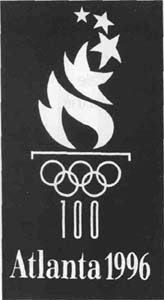The Olympic Legacy on Parks and Recreation
by Jayne Turpin DeLuce and Joe DeLuce On July 19,1996, the eyes of the world will be on Atlanta for the opening ceremonies of the Centennial Olympic Games. As 10,500 athletes from almost 200 nations prepare for competition, more than 80,000 spectators will enjoy the magnificence while two-thirds of the world's population will watch on television. Over the course of 16 days, the Atlanta Committee for the Olympic Games (ACOG) will make history by implementing 271 medal events in 26 sports while hosting more than two million visitors. On August 4, the closing ceremonies will conclude the world's greatest sporting event and the torch will be passed to Sydney, Australia, for the next summer Olympic Games in 2000. The Olympic tradition will move to another country, but the effect on parks and recreation in the United States will continue into the 21st century. The public will become more aware of new sports and be ready to participate. Consider the following facts. • More than 3,700 women are scheduled to compete in the Centennial Olympic Games, which is the largest number ever and about 600 more than the number of women who competed in the 1992 Olympic Games in Barcelona. Women will be competing for the first time in football (soccer) and softball and new women's events have been added to swimming, athletics (track and field), track cycling, road cycling, fencing, gymnastics, rowing, and shooting. • Men and women will be competing for the first time in beach volleyball. Sponsorship dollars and television coverage have already greatly increased for this sport during the last five years. • Since 1985, mountain bike sales have tripled. As a new Olympic sport in 1996 for men and women, mountain bike racing is one of the top growing sports in the United States and rising steadily in Europe. • After synchronized swimming solo and duet events were introduced at the 1984 Olympic Games in Los Angeles, youth programs increased by 80%. The team event has replaced the solo and duet events for 1996 and the United States team is a reigning world champion. • For the future, the 2000 Olympic program in Sydney, Australia, has added two new sports to date: taekwondo and triathlon. • In order to be considered for the summer Olympic program, a sport must be widely practiced by men in at least 75 countries and on four continents and by Illinois Parks & Recreation • January/February 1996 • 21 women in at least 40 countries and on three continents. Sports are admitted seven years before specific Olympic Games. To be successful, events have to have mass appeal and a strong base of development programs. Parks and recreation play a role in the long-term success of a sport by becoming aware of new sports and being ready to take advantage of the opportunities they offer. Preparation must be made to provide the appropriate services and facilities. For example, the interest in mountain bike racing has already impacted the use of park trails, creating a necessary cooperative effort between riders, hikers, and horseback riders. Restricted passive park areas have become a challenge for riders to discover and conquer. Quality programs, facilities and services complement long-term planning. This is the time to prepare and become involved in the Olympic movement. Several possibilities include:
22 • Illinois Parks & Recreation • January/February 1996
In 1960, there were 150 events in 17 sports on the program in Rome, Italy, compared to the 271 different events in 26 sports for the Centennial Olympic Games. The Olympic movement will continue to expand and will facilitate the popularity of sports. Tennis, for example, was approved on the Olympic program in 1896, was discontinued in 1924, and was approved again in 1988. With increased programming and marketing efforts, this sport will continue to rise again in popularity. Parks and recreation must take advantage of the Olympic movement and its many opportunities including new programs, potential revenues, and increased community spirit. Who knows, you may develop the next Mary Lou Retton, Bonnie Blair or Michael Jordan! And don't forget, the 2002 winter Olympic Games are just around the corner in Salt Lake City! Jayne Turpin DeLuce is the director of aquatics for the Atlanta Committee for the Olympic Games. Joe DeLuce is the executive director of the Macon (Georgia) Sports Commission. Together, the authors have more than 30 years experience in parks, recreation and sports management.
Important Note: Unauthorized use of "Olympic" symbols, emblems, trademarks and names in promoting athletic and cultural events is prohibited by the United States Olympic Committee. Caution should be used when promoting local events in conjunction with the Olympic Games. For further clarification of this law, contact the United States Olympic Committee. Illinois Parks & Recreation • January/February 1996 • 23 |
|||||||||||||||

